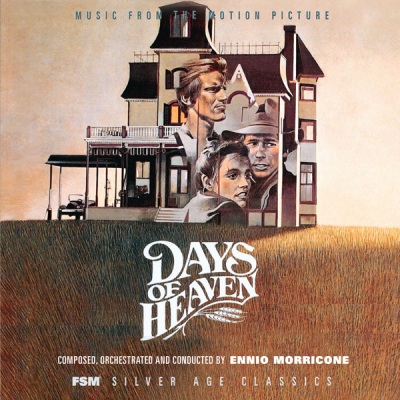
Days Of Heaven
1978年影片《Days of Heaven》原声。 Terrence Malick’s Days of Heaven (1978) is one of the most visually beautiful films ever made. Dreamlike and elliptical, it follows a trio of turn-of-the-century Chicago migrant workers (Richard Gere, Brooke Adams and Linda Manz) to the Texas Panhandle, where they wind up working the wheat fields of a rich and lonely farmer (Sam Shephard). The film also boasts one of the most gorgeous and haunting musical scores ever written by a master of all that is gorgeous and haunting: Ennio Morricone. Morricone composed three principal themes for the picture: a “Main Theme” (which intentionally references the “Aquarium” movement from Camille Saint-Saëns’s Carnival of the Animals), a pastoral melody for flute (full of optimism and hope), and an unforgettable, elegiac love theme—one of the most compelling and beautiful melodies of the composer’s storied career. In an unusual move, Morricone gave Malick permission to move cues around—the end result being that much of the music was relocated to different parts of the film than those for which it was composed. Still further differences exist between the music as heard in the film and as it was presented on the soundtrack LP issued by Pacific Arts Records and Tapes. Because of these differences, this 2CD set of Morricone’s music for Days of Heaven features three programs, all newly remastered from the ½" three- and four-track mixes created in Rome (with a few redone in Los Angeles). Tracks 1–13 on disc 1 recreate the 1978 soundtrack album, which included most of Morricone’s major themes as well as music not heard in the picture. Tracks 14–30 present the Morricone cues as heard in the finished film—without replicating abridgements and repetitions of certain selections. Disc 2 presents an extended, freestanding program of most (but not all) of Morricone’s score as recorded, following the chronological sequence of the slate numbers, along with a handful of bonus tracks. Here the score proves to be considerably more diverse than in the finished film. Days of Heaven’s gorgeous cinematography is captured in some of the film stills selected by designer Joe Sikoryak for the 16-page booklet. Since no paperwork survives to indicate the screen action Morricone intended his cues to underscore, FSM has not included the customary track-by-track commentary, but an informative essay by Lukas Kendall and Jeff Bond provides useful background on film and score. The film is about nothing less than the human experience on earth—fleeting “days of heaven” torn asunder by twists of fate and the selfishness of human society. Morricone’s music is a bittersweet expression of the search for happiness and the inevitability of loss that marks the human condition. Days of Heaven remains one of the pinnacles of his astonishingly productive and innovative career.
